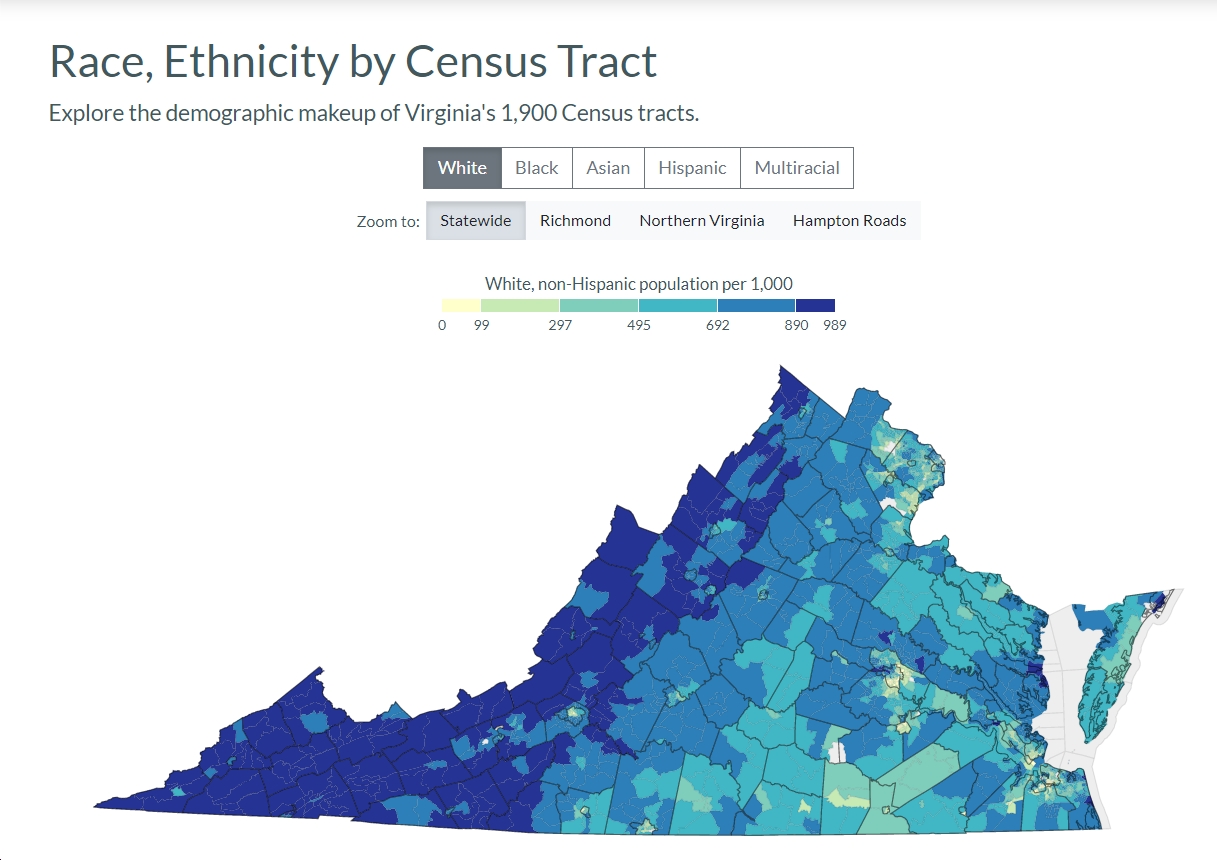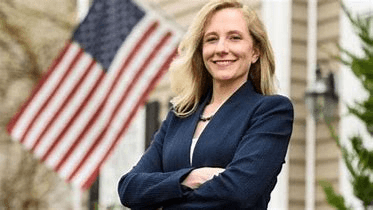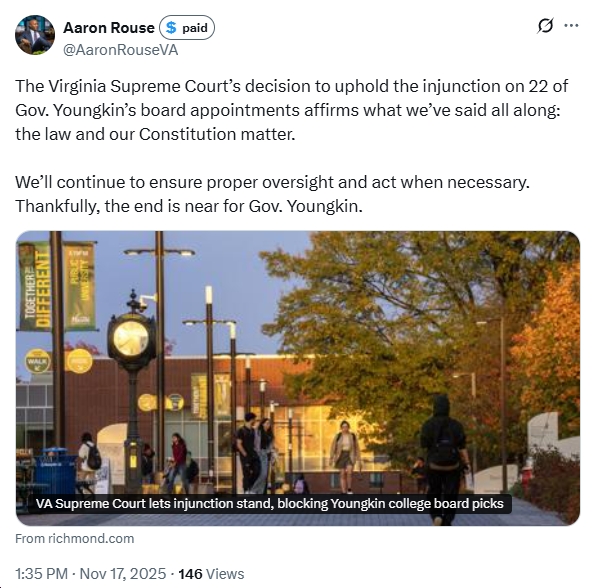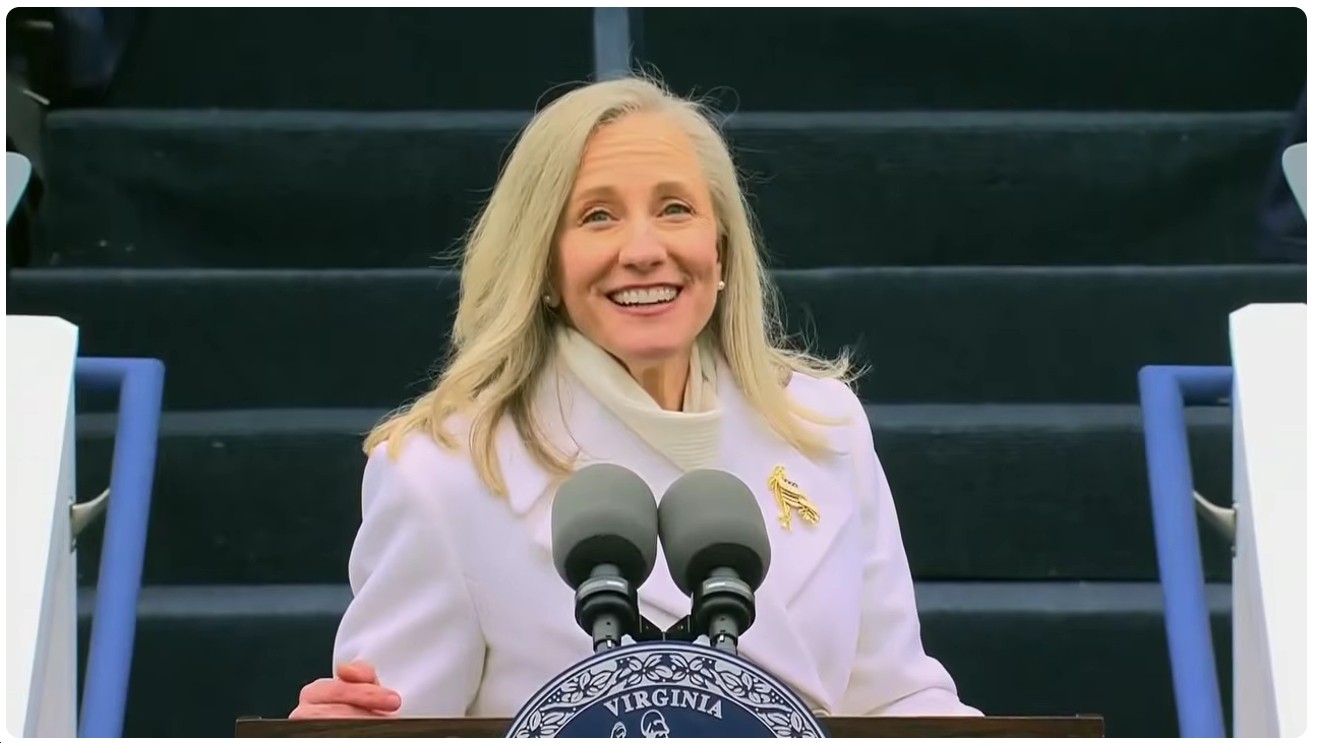by Paul Goldman
This past Wednesday, the Virginia House Privileges and Elections Committee (on an 11-10 vote) tabled a constitutional amendment by Sen. Bill Stanley (R-Chatham) that would have “require[d] the General Assembly to provide for a system of public schools in the Commonwealth with equitable educational opportunities for all children and to ensure that all school-age children are provided with equitable educational opportunities.”
As usual, rural legislators are claiming that Northern Virginia legislators are intentionality damaging the school children of their region. This is always a sure-winning election year play to galvanize rural voters. This year’s version of “evil NOVA” is the fight over the racist poison pill in the Education Clause of the Virginia Constitution. Contrary to what Virginians have been told, the Constitution does not guarantee equal educational opportunity to all our children. The last segregationist Governor, Mills Godwin, wanted to make sure minority kids would not get that right. He succeeded. Rural legislators did not mind the language when it only hurt minority kids. But Governor Godwin’s “poison pill” has now boomeranged against their white, rural residents.
So last Wednesday, they suddenly claimed to be mightily upset at the situation. What the rural legislators failed to say was the following: I have been writing and talking about the situation for many years. No rural legislator much cared. To be fair, no Northern Virginia legislator cared either.
In January of 2018, I wrote yet another column on this Constitutional matter with GMU Professor and Dean Mark Rozell. It is very subtle how the segregationists blocked the right to equal educational opportunity. The Virginia Supreme Court pointed it out in 1994. But 24 years later, Rozell and I could not find any legislator, much less newspaper editorialist, to fight for equal educational rights.
As it happened, Bill Stanley and I were working together on a related matter, the decrepit condition of the state’s school buildings. Sen. Stanley proved a quick study on the failure of the Virginia Constitution to give all children an enforceable right to equal educational opportunity. Stanley’s bill got killed by Senate Committees in 2019 and 2020.
Now in 2021, Stanley suddenly got his proposed Amendment passed by the State Senate. But to get it passed, he agreed to a change in the language. I think the change was a mistake. Not surprisingly, none of those rural legislators now praising Stanley and attacking NOVA were a cosponsor.
“These NOVA legislators don’t care about us,” declared Senator Bill Stanley last week, the leader of the rural legislators, after a House of Delegates Committee killed his proposed amendment to the Education Clause of the Constitution of Virginia. “They don’t care about using public education to help our kids…their children get to attend nice new shiny and modern schools…while others who live in the rest of Virginia can’t…Northern Virginia just doesn’t give a damn.” He was quoted in a Roanoke Times editorial, “House Democrats turn their backs on rural Virginia.” (The amendment had passed the Senate 34-1, but this week was tabled in House Privileges and Elections 11-10-1).
The Roanoke Times editorial page has covered the work that Stanley and I were doing on the equal educational opportunity issue. Did those 10 rural legislators now so passionate about equal educational opportunity show up in the paper’s editorials helping us in any meaningful way? No.
This has long been my issue, a lonely fight to keep justice alive in that regard. Now, I must call him out the Roanoke Times and all those rural legislators trying to benefit from unfair attacks on NOVA “liberals.” The fact is, allowing the election politics of rural lawmakers ruin my long fight to help rural and minority kids serves no purpose – even if the 11 suburban and urban Democrats who blocked Stanley’s bill made a mistake by falling into the trap laid by the segregationists years ago.
Now, I ask everyone to take a step back. I have spent years trying to bring rural, suburban, and urban legislators together on this matter. We cannot fix education with a racist Educational Clause in the Constitution. Indulge me then in this in-depth detailed history of how we got to this moment in constitutional time. When you get to the end, I believe my proposed actions will be necessary and proper immediate steps.
1970: Virginia’s public education is being ruled from the grave by segregationists.
Virginia’s last segregationist governor, Mills Godwin, knew the federal civil rights laws inspired by Dr. King and his movement, along with President Johnson’s Great Society, meant the state had to junk the existing Constitution written by white supremacists. But Governor Godwin had no intention of giving black students the right to equal educational opportunity in the new state Constitution.
Godwin, an unrepentant racist, got his cronies to write the Education Clause to the current Constitution of Virginia to reflect their bigotry. Contrary to what legislators claim, the Constitution of Virginia does not give any child in your family the right to equal educational opportunity. It only promises to “seek” the highest quality for all. Thus, all the Constitution of Virginia promises unenforceable aspirations. The General Assembly is thus unaccountable for all its failures since the 1954 Brown decision.
Why does this matter? If the Virginia Constitution gives you a right, then the state has a duty to you to make it happen. If it fails, citizens and attorneys can sue to enforce such a right. And win. This in turn would require the Supreme Court of Virginia to hold the state accountable for the failure. Godwin wanted to prevent that. Thus, his language created a goal “shall seek to ensure” that sounds like a right but is merely a goal with no teeth. The Educational Clause was likewise vague on funding matters.
1986: Broken compact on funding to favor road developers over schools.
Prior to this year, the state sales tax had been the education tax, designated as the main source of state education funding. But Northern Virginia legislators were getting heat from constituents on the transportation issue. The segregationist Byrd Machine had intentionally shortchanged NOVA and Tidewater on road funding. Byrd instead made sure road money flowed to the rural areas constituting the backbone of his political machine.
Governor Gerald Baliles did not believe the state’s gas tax could fund the road construction needed in Virginia. He decided to break his campaign promise and proposed using the sales tax to raise money for transportation. This had never been done in any state.
Lieutenant Governor Wilder and I discussed Baliles’ proposal to increase the sales tax. I did the fiscal analysis and proved that the General Assembly fudged the numbers to make the Governor’s plan seem balanced in terms of revenue and costs. The roads would cost billions more than the General Assembly claimed. This had big implications for education funding in the future.
More importantly, Baliles’ plan had the practical effect of now harnessing the sales tax to raise road money. In my view, once the General Assembly started demanding the sales tax be used for roads, there would never be any sales tax increase only for education. In the end, this would eventually cost education billions of much-needed dollars. He should have let the voters decide, in a referendum, on changing the basic use of the sales tax. It should be their choice. Not the politicians in Richmond.
For the only time in Virginia history, a Lieutenant Governor refused to support the major initiative of a Governor of his own party. Wilder showed real principle and guts in such a public break. It was a gutsy move. Baliles’ tax plan passed narrowly, with strong support from NOVA. Wilder’s unprecedented break likely saved him from defeat when running for Governor in 1989.
1994: Shortchanged citizens sue for education funding.
Rural counties in Southwestern Virginia had several years before filed a lawsuit claiming the state’s funding formulas created severe disparities in educational opportunities, thus violating the Virginia Constitution. Governor Wilder told the lawyer for the counties his constitutional theory would not fly in the Virginia Supreme Court and might set the cause back with a loss. The Constitution had been written by Godwin to kill any such argument. Doug was right. Even the trial judge told the lawyer his argument had no legal standing even though it had moral and policy merit. As predicted, the court in Scott v. Commonwealth ruled that Godwin and his boys had done their nefarious work well.
1995: Constitutional fix
Realizing the Education Clause had to be changed, a few rural legislators sponsored a constitutional amendment to remove the poison pill now also boomeranging against their rural white school students. Several urban Democrats like Louise Lucas joined them. She understood how her constituents were likewise hurt by the language in Article VIII, Section 1 of the Education Clause.
Democratic leaders running the House of Delegates killed the proposal in Committee, 3-2-5, led by Speaker Tom Moss. It was a cleverly orchestrated hit job. The top two rural Democrats voted to adopt the language. This allowed each to seen as champions of rural school kids But, they knew the three others representing urban metro areas would vote it down. They could tell constituents it had been a procedural vote. The Democratic leadership sent their message. The next year, they formed a Commission to look at education; has anyone ever read it?
2009: Funding can be restored through historic tax credits.
I knew from my educational advocacy in Richmond that the decrepit condition of public-school facilities made equal educational opportunities impossible for the city’s school children, mostly black and from homes with modest incomes. Professor Glen Earthman of Virginia Tech had been perhaps the leading expert on this correlation in America, cited by President Bill Clinton years before. I had long ago accepted Dr. King’s teaching that “Education is the great equalizer.” I spoke with Earthman.
In my effort to find a way to achieve Dr. King’s goal on education, I had discovered how a glitch in federal law had been driving up the cost of locality school renovation by perhaps 35%. Ironically, years before Richmond Mayor Tim Kaine had figured out a way around this glitch to renovate the historic Maggie Walker High School. He saved upwards of 40% by my analysis, allowing the stalled project to get done. Kaine wrote an article about the project for a local weekly.
But my research showed his project had been a one-off due to the strictness of the federal law at issue. Thus, I realized we had only one choice: eliminate the glitch. So, I discussed the matter with former Republican Senator George Allen, who agreed to help. We wrote a seminal piece for the New York Times which showed how Virginia alone might benefit to the tune of $10 billion in education funds if we could take the Kaine approach and make it available to every local school building renovation. Basically, the glitch in federal law does not allow local school projects to take advantage of historic tax credit financing even though many hundreds of school buildings in Richmond and Virginia, likely 40,000 around the country, are sufficiently aged to otherwise qualify for this federal program, a favorite of Republican lawmakers in Congress.
The Times article got national attention. All around the country, in rural, suburban, and urban areas, decrepit schools were damaging educational opportunities, just as Professor Earthman had shown. Senator Jim Webb and Republican Majority Leader Eric Cantor took the idea in the op-ed and put it into a bill. Governor Kaine wrote the Democrats in Congress advocating historic tax credit financing. But Democrats resisted. Obama’s infrastructure folks likewise misunderstood the Times article. They preferred getting money directly from the federal government as opposed to my approach of using a private/public partnership using private funds. But the Obama Administration was never able to deliver on its promised financing package for school modernization.
2013: McDonnell doubles down on road financing but asks for a real study.
Once again, the road lobby in the General Assembly put great pressure on a Governor to find more money for highway construction. Bob McDonnell had failed for several years to find a new source of highway dough. In his final year, he chose to build on the Baliles approach and proposed raising the sales tax as education advocates had long feared would happen. His approach also imposed a regional sales tax on top of the state sales in NOVA and Tidewater, with the Richmond Metro area also facing it if it grew to a certain size. Even worse, the McDonnell approach dedicated newfound revenue from an anticipated Internet Sales Tax, slated to grow larger and larger, mostly to transportation, if such taxation was permitted in the future by the Supreme Court, as it eventually was in South Dakota v. Wayfair (2018).
I pointed out the potentially drastic effect on choosing roads over education in terms of future funding to Democrats including presumptive gubernatorial nominee Terry McAuliffe. As I recall, Terry acknowledged a short term hit, but said that could be fixed later. His presumptive Republican opponent, Ken Cuccinelli, was no fan of McDonnell’s proposed tax increases or the Governor himself. Terry saw a chance to play a little triangulation politics. As a political strategy, it had merit given Terry’s big ticket political persona. I got the politics. But that did not alter the damaging educational funding dynamics at the state level.
I had by now given up any hope of getting Democratic support for fixing not only the Education Clause, but a major and growing obstacle to equal educational opportunity: the decrepit condition of the state’s school building. In 2013, Governor McDonnell had called me into his office to discuss the problem. He supported the efforts of Kaine and Warner to enact their tax credit proposal, knowing it would be the biggest federal boost to public school infrastructure since Lincoln’s famous 1862 law. He asked me how he could help my advocacy on the matter. I told him. He immediately agreed to do the first ever gubernatorial inventory of our public-school infrastructure.
The results were shocking. The average Virginia public school student attended a facility deemed obsolete by Obama Administration educational standards. I knew things were bad. But that bad? McDonnell seemed shocked. It made the Kaine and Warner legislation even more urgent.
2019: Windfall taxes used for roads, not education.
As expected, the Supreme Court in 2018 ruled that internet sales could be taxed across state lines and thus Virginia scrambled to begin collecting taxing them. I was working with Senator Bill Stanley on a way to fix our rundown school building. Again: I got no help from any Democrat in that regard. But Stanley remained true to his promises.
We got the idea of using the new revenue from the digital economy. But the Governor and General Assembly Democrats insisted on using the billions and billions mostly for roads. Admittedly, this had been part of the 2013 McDonnell proposal. But times had changed. Education needed the money more than roads. Besides, road construction could still be funded through a gas tax.
Once again, the General Assembly chose roads over schools. Governor Northam had mentioned the decrepit nature of our schools as a major state problem in his 2018 Inaugural Address. But roads still came first.
Stanley asked the General Assembly to put a referendum on the ballot asking voters whether they would support the first state general obligation bond for public school infrastructure. The state has issued dozens of such bonds to support higher educational infrastructure. But never K through 12. His measure failed in Committee.
2020
Stanley again introduced his Constitutional Amendment and bond issue. They never got out of Committee – or, more accurately, the Amendment was tabled until 2021, with the baffling claim that the General Assembly did not do constitutional amendments in an even year.
2021: Phony Rural v NOVA fight
The proposed Constitutional Amendment on the Education Clause went through the Senate nearly unanimously. Impressive, for sure, and the Senate should be lauded for so strongly recognizing the merits of this plan.
However, they inserted a very troublesome change. Instead of the “equal educational opportunity” promise well-grounded in case law, the Senate changed the word “equal” to “equitable.” Why? I do not know. But I do know this: The General Assembly and state leaders in the early 1990’s believed they could satisfy the “equal educational opportunity” requirement by claiming VMI could legally keep denying admission for women as long as it funded the “equitable” military program for women at nearby Mary Baldwin. I knew this to be balderdash legally. Several years later, Justice Ruth Bader Ginsburg ruled the “equitable” program violated the requirement of equal educational opportunity in United States v. Virginia (1996).
Accordingly, I think Stanley’s bill wrongly amended. It merely needed to be revised by the House and sent back to the Senate. This seemed easily done.
However, the House did not try to amend it. They killed it. Moreover, the House gave a totally absurd reason: they said voters could not handle more than two constitutional amendments in any year and they already had two others picked out. They could not therefore agree to a third. I have studied the history of Constitutional Amendment referendums. They go back to 1927 on the state website. There have been numerous times when voters were asked to approve or disapprove three or more amendments in the same year. Recall last year Democratic leaders they said they could not pass it because it was an even year; this year the House offered another specious explanation.
I understand Stanley has a legitimate legislative beef. But rural legislators have falsely charged that NOVA legislators refused to change the Constitution out of indifference to the plight of white rural students. This is absurd.
Everyone is playing politics here. Rural legislators get votes from falsely attacking NOVA. Democrats get to deny a conservative white Republican credit for removing a racist clause from the Virginia Constitution that was holding back not just his rural base but black and brown and Latinx students in urban and suburban areas would be a potentially powerful statewide Republican candidate. The politicians win, the kids lose.
After 67 years: I say enough is enough.
Moving forward together to end the segregationist’s legacy.
My solution. First, we need to stop letting segregationists rule us from the grave. We need to take the poison pill hurting our kids out of the Constitution. We can differ over the right language. Thus, let the legal scholars draft it for us. Then run the language past the VEA and other educational advocates. We can still pass the measure this year. This is imperative given the process for amending the Virginia Constitution. If we do not act this year, the goal gets set back at least until 2024.
Second, the Governor and General Assembly, indeed all education advocates, need to get behind the Kaine/Warner legislation to harness private capital to help renovate our schools. The quicker we get kids into modern facilities, the quicker we can achieve equal educational opportunity. The problem is not fixable without Congress and President Biden doing their part. The 2020 Democratic Party Platform promises such a federal/state/local partnership. House Democrats passed a version of the measure last year led by Philadelphia Congressman Dwight Evans. The full Congress can do it this year.
And thirdly: I conceived of the effort to fix the Education Clause to bring us together. The Kaine/Warner legislation offers the chance to better fund an unprecedented construction initiative that will save localities billions which in turn can be shifted to an unprecedented instruction initiative. As a practical political matter, rural Virginia cannot win a fight with NOVA. And Virginia cannot do it without the help of Washington. .
What started as bigotry against minorities now has morphed into unfair burdens on white rural kids too. We are all in the same leaky boat here, suburbanites too. We need each other to solve it. As Ben Franklin advised, we either hang together or we hang separately.



![Virginia NAACP: “This latest witch hunt [by the Trump administration] against [GMU] President Washington is a blatant attempt to intimidate those who champion diversity.”](https://bluevirginia.us/wp-content/uploads/2025/07/gmuwwashington.jpg)













